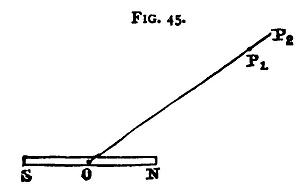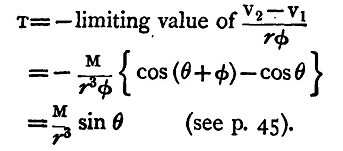| Practical Physics is a free textbook on basic laboratory physics. See the editorial for more information.... |

|

Home  Magnetism Magnetism  Force due to a Solenoidal Magnet Force due to a Solenoidal Magnet |
|






|
|
Force due to a Solenoidal Magnet
To obtain this we must remember that the work done on a unit pole by the forces of any system in going from a point P1 to a second point P2, V1, V2 being the potentials at P1 and P2, is V1 - V2. Let a be the distance between these two points, and let F be the average value of the magnetic force acting from P1 to P2 resolved along the line P1P2. Then the work done by the force F in moving the pole is Fa. Hence Fa = V1 - V2 and if the distance a be sufficiently small, F, the average value of the force between P1 and P2 may be taken as the force in the direction P1P2 at either P1 or P2.
when a is very small Let us suppose that P1, P2 are two points on the same radius from O, that OP1=r and OP2=r+δ. Then θ is the same for the two points, and we have
neglecting (δ/r)2 and higher powers (see p. 42). Also, in this case, a=δ. Thus
We shall denote this by R, so that R is the force outwards, in the direction of the radius-vector, on a unit pole at a distance r from the centre of a small solenoidal magnet of moment M. If the radius-vector make an angle θ with the axis of the magnet, we have
Again, let us suppose that P1P2 (fig, 46) is a small arc of a circle with O as centre, so that
OP1=OP2=r Thus a=P1P2 = OP1 x P1OP2 = rφ.
The force, in this case, will be that at right angles to the radius vector, tending to increase θ; if we call it T we have
These two expressions are approximately true if the magnet NS be very small and solenoidal. We may dispense with the latter condition if the magnet be sufficiently small; for, as we have said, any carefully and regularly magnetised bar behaves approximately like a solenoid with its poles not quite coincident with its ends. In such a case 2l will be the distance between the poles, not the real length of the magnet, and 2ml will still be the magnetic moment.
|
|
Home  Magnetism Magnetism  Force due to a Solenoidal Magnet Force due to a Solenoidal Magnet |
|
Last Update: 2011-03-16









